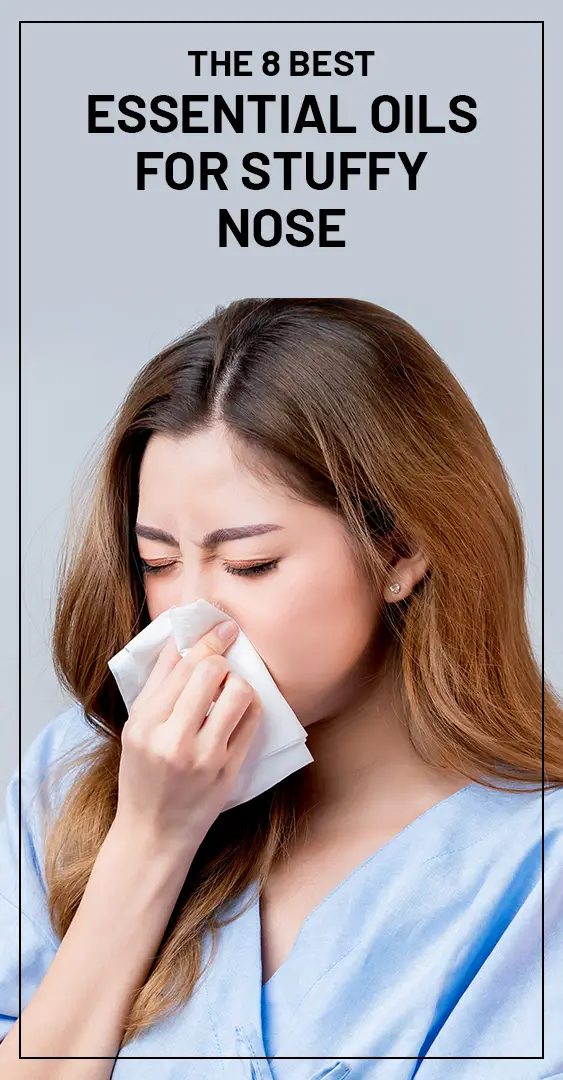
Important: This article is for informational purposes only. Please read our full disclaimer for more details.
Essential oils for a stuffy nose can be used to improve your stuffy noses in a variety of ways. For example, they can help clear out mucus and debris, soothe irritated tissues, and boost the immune system. In addition, essential oils can also provide a much-needed sense of smell during periods of congestion.
What Causes a Stuffy Nose?
There are many things that can cause a stuffy nose, they include:
- Allergies
- The common cold
- Sinus infections.
However, the most common cause of a stuffy nose is inflammation of the nasal passages. This can be caused by a variety of things, including
- Irritants in the air (such as dust or pollen),
- Changes in temperature (such as when you go from a warm room to the cold outdoors),
- Or viral infections (such as the flu).
What are the Best Essential Oils for a Stuffy Nose?
There are a number of essential oils that can be helpful for relieving a stuffy nose. Some of the best include:
1. Peppermint Oil
This oil has a cooling, refreshing effect that can help to clear sinuses and relieve congestion. It also has anti-inflammatory and antimicrobial properties, which can help to reduce the risk of infection.
2. Tea Tree Oil
This oil has a strong, fresh scent that can help to clear the sinuses and relieve congestion. It also has antifungal and antibacterial properties, which can help to reduce the risk of infection.
3. Eucalyptus Oil
This oil has a refreshing, minty scent that can help to open up the sinuses and relieve congestion. It also has anti-inflammatory and antimicrobial properties, which can help to reduce the risk of infection.
4. Lavender Oil
This oil has a calming, floral scent that can help to soothe irritated tissues and reduce inflammation. It also has antimicrobial properties, which can help to reduce the risk of infection. [1]
5. Chamomile Oil
This oil has a sweet, floral scent that can help to calm the nerves and reduce inflammation. It also has antimicrobial properties, which can help to reduce the risk of infection. [2]
6. Rosemary Oil
This oil has a fresh, herbaceous scent that can help to clear the sinuses and relieve congestion. It also has anti-inflammatory and antimicrobial properties, which can help to reduce the risk of infection. [3]
7. Thyme Oil
This oil has a strong, herbaceous scent that can help to clear the sinuses and relieve congestion. It also has anti fungal and antibacterial properties, which can help to reduce the risk of infection.
This lacks scientific studies to prove it’s effectiveness.
8. Oregano Oil
This oil has a strong, pungent scent that can help to clear the sinuses and relieve congestion. It also has antiviral, antibacterial, and antifungal properties, which can help to reduce the infection. [4]
How Do You Use Essential Oils for a Stuffy Nose?
There are a number of ways that you can use essential oils for a stuffy nose. Some of the most effective include:
- Inhaling the Vapors: You can use a diffuser to disperse essential oils into the air, or you can simply add a few drops of oil to a bowl of hot water and inhale the vapors.
- Rubbing on the Chest and Back: You can also rub essential oils onto your chest and back to help relieve congestion.
- Applying to the Skin: You can also apply essential oils directly to your skin, although it is important to dilute them first in order to avoid irritation.
When Should You See a Doctor?
If your stuffy nose is accompanied by other symptoms, such as fever, headache, or severe pain, then you should see a doctor. In addition, if your stuffy nose does not improve after a week of home treatment, consult a doctor immediately.
Essential oils can be a helpful addition to your home treatment for a stuffy nose. However, it is important to consult a doctor if your symptoms are severe or do not improve after a week of home treatment.
Do remember that essential oils are highly concentrated and should be diluted before applying to the skin. Inhaling the vapors is generally considered safe, but always check with your doctor before using any essential oils, especially if you are pregnant or breastfeeding.
You Might Also Like:
- Headache And Nosebleed: Causes, Treatment, And Prevention Tips
- Does Ice Make Your Nose Smaller?
- Red Spot On Nose: Causes And Treatments
- Why Do I Wake Up with a Stuffy Nose?
- Can Teething Cause a Runny Nose and Sneezing
- Yoga for Sinus: 6 Best Yoga Poses for Sinus Relief
- How to Get Rid of Blackheads on Nose Naturally at Home?
- How to Get Rid of Scabs in Nose, Causes, Treatment, Remedies?
- 10 Essential Oils for Sinus Congestion And How To Use It
- Essential Oils for Hair Loss: Benefits and How to Use
- Essential Oils for Dandruff – Benefits and Uses
- How to Use Olive Oil for Hair Growth? Benefits and Uses
- Essential Oils For Frizzy Hair: How Do They Help?
















